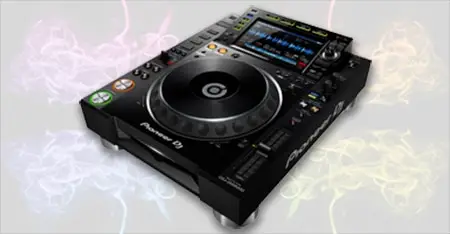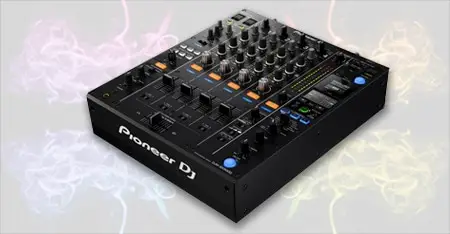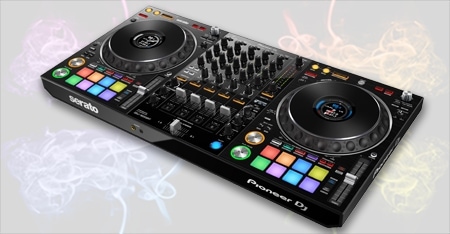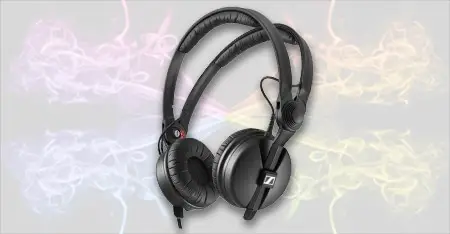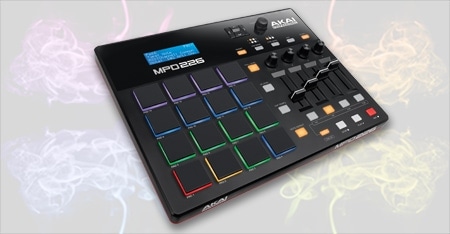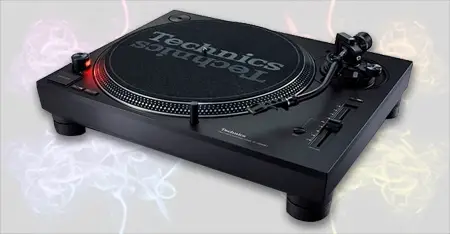
How to become a DJ? What to do to be a DJ? How to make a mix? What even is a mix? How to get into DJing? And what software do DJs use? These are all common questions for people looking to get into the amazing and satisfying world of mixing music.
The best way to become a DJ is to fully immerse yourself in your favorite music and start playing with some kit. There is software available for both your laptop (if you already one) or smartphone. Any software will allow you to learn the basics and get you started on your DJing journey.
Following the explosion of EDM over the last few years, the idea of becoming a DJ has reached the masses and inspired a lot more people to try the art.
This means there are so many resources out there that things can get a bit confusing. That’s what I’m going to break everything down for you in one place.
So, You Want to Become a DJ?
Contents
When you begin DJing you are learning to express yourself to a crowd of people via your music taste.
You’ll learn how to control a vibe and take people on a journey to make sure they enjoy their evening. It’s about understanding and interacting with a crowd to ensure you both go on that journey together.
People often get overwhelmed with the idea of DJing as the technical side can seem quite complex. It doesn’t have to be, however, at the very basic level DJing is about playing great music to appreciative people.
DJing come a long way from the early days of people playing vinyl. I mean in the very early days the best DJ was the one with the smallest amount of silence between two songs! Now, of course, we mix songs so that DJ sets are seamless.
There are many ways to start DJing so your goals will very much depend on what aspects interest you most.
It could the tune selection, the technical side or you love learning new skills. Perhaps you love playing with lots of equipment or prefer to use a simple setup and let your music do the talking. All of this will be covered.
I’m going to break down every aspect of DJing so you can choose the bits that are most relevant to you. This will help you get the quickest results for your goal.
One of the great things about DJing is that you can do the bulk of the teaching yourself. All you need to do is listen to your favorite music and your favorite DJs, easy right?! You can then watch videos to understand the technical aspects behind creating a DJ mix.
Nothing is stopping you from getting some of your favorite music and starting to mix and record immediately.
Pretty soon you’ll be performing live to audiences which further builds your skills and takes them to the next level.
Some Notes Before We Dive In
Many people don’t realize that becoming a DJ isn’t just a career choice, it’s much more than that. It is a brand new lifestyle.
Perhaps the most common thing amongst all DJs is the love for music, so that’s where you’re going to want to start.
The best DJs spend all their time listening to and finding new music and putting mixes together. Including in their head when they’re not even anywhere near a deck! After all, with headphones, you can be “practicing” and researching your art wherever you are.
If you don’t love music then you’re probably not gonna love DJing. Especially given how hard it can be to start but once there’s momentum you’ll be surprised how easy it is to find gigs.
Also, the Internet and the introduction of new companies into the industry means that the barrier to becoming a DJ has never been lower.
There are all sorts of equipment, some essential, some not, some expensive and some reasonably priced. As well as DJ software that’s free all the way up to pro level.
All of this will be covered as well in this full guide into how to become a DJ.
What Are the Different Type DJs?
At the base level, DJs use their musical knowledge and intuition to build sets out of tracks that influence the mood of a crowd.
They can build it up in such a way that brings people together and keeps them dancing.
However, there are a few types of DJ who go about this in slightly different ways.
The Club / Festival DJ (including Residents & Guests)
More often than not, this will be what people imagine when they think of “DJs”. Someone behind the decks slamming out banger after banger and keeping the dance floor packed and moving.
Strictly speaking, there are two types of club DJs.
A “resident DJ” is normally a local DJ that plays in that specific club regularly (be it monthly or weekly). It is not uncommon for them to have several residences around the city/area that they live in. This can be a great way of getting yourself out there while earning an income while you establish your career.
The second type is touring DJs. These are the “special guests” that appear at the club every so often and are the ones that people imagine on the stages of festivals.
However, it is club gigs that are their bread and butter. These types of DJs also tend to be producers (see the explanation of producers below).
Both types of Club DJs need the same set of skills. To be able to read the crowd and control the vibe to make as many as possible enjoy their evening. Dictating the energy and bringing it up & down in a smooth way keeps the crowd engaged and entertained.
Becoming a DJ, either resident or touring, is very much about networking to get gigs. As well as honing your skills of course.
Turntablists & Technical DJs
This is a style of DJing that grew out of early hip-hop parties. Specifically the house parties of one particular DJ in 1972…
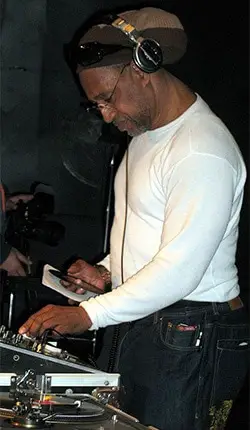
Using two copies of the same vinyl DJ Kool Herc used to loop his favorite part of the tracks. By quickly switching between them he could extend the break and make it as long as he wanted to.
Other DJs took this idea and continue to expand on it to this day.
At the core, the idea is to be super technical in your mixing. Fitting in as many tricks and slick moves to piece the music together as possible.
While the crowd will dance, this type of DJing is also very much about watching the spectacle.
This is where scratching (the art of manually manipulating a record) and beat juggling (a complex form of looping) come from.
Turntablism is now such an art form that several worldwide competitions aim to find the best DJ every year. Probably the most famous DJ competition is the DMC, where DJs are given just 6 minutes to showcase their skills.
This has heats that take place in cities all over the world that lead to country finals and eventually World Finals, usually held in London in September.
To become a DJ that specializes in Turntablism takes an extreme amount of commitment to practice.
For a better idea of what a turntablist does, check out this video of DJ Woody who uses turntablism to create brand new tracks live.
The Mobile / Event DJ
These are the types of DJs that you see playing at weddings, launch parties, in shops or at conferences.
To become this type of DJ you have to be much more comfortable with playing commercial music. Generally, you are there to support the event and set the soundtrack instead of being there to play a specific type of music and promote yourself.
Wedding DJs, for example, have to be extremely comfortable playing commercial (i.e cheesy music). It is the easiest way to cover a broad taste in music and keep a mixed crowd as happy as possible.
DJs that play during the day in trendy retail shops, for example, tend to play commercial dance music. This helps keep the energy up and encourage people to shop more. The aim is also to draw people in from the street using their music.
You arguably do have less control over the music you are playing. And might end up playing some tunes that you actually dislike (because of crowd requests, particularly at weddings). Yet, the mobile DJ can be one of the best paid, and regular, DJing gigs. This is especially helpful in the early days of your career.
Becoming a DJ that does events is perfect for supporting your practice before DJing turns into a full-time job.
Occasionally the mobile DJ will also have to get on the mic. Either to make announcements or to encourage the crowd onto the dance floor for example. So, it is best if you are comfortable speaking to crowds. Although of course this is essential and it is a skill you will build up with practice anyway.
The Radio DJ
The term “Radio DJ” is not entirely accurate anymore, at least not in what people think when they hear “DJ”.
Most radio DJs are just playing tracks from a computer that are pre synced (or “segued” as they are called in the industry). In this case “Radio Presenter” is a much more accurate term.
In this case, they are more about presenting either information or a specific type of show. Although even if it’s around music this will generally still be played off computers, especially at the larger stations.
If a Club DJ has a show on the radio then it tends to be on some of the more specialized radio stations, such as the dance station Kiss FM.
To become a DJ on the radio then read our in-depth guide here, including the old school trick that no-one uses.
What type of DJing you want to be can help you determine where to focus your attention.
If you want to be a club DJ in a certain genre then you’re going to want to educate yourself on that genre as much as possible.
If you imagine yourself playing cheesy music at feel-good events then build up your collection of all the greatest hits from the 50s up to now. This way if you ever get a request you can keep that person happy by playing the song they are asking for.
DJ / Producers
When you think of superstar DJs these are generally the ones that will come to mind. These are the people that make a name for themselves by making music first and being a DJ second.
Imagine Skrillex (see his amazing setup here) for example, he made his name by releasing an album online for free. First of all, it sat there for a year before someone picked it up and it went viral. People knew his music before they knew him as a DJ, it was only after his music was massive that he started touring.
However, that doesn’t mean that you should entirely focus on producing music and then becoming a DJ. The two can work hand-in-hand, as learning elements of one will help you improve in the other.
I have seen DJs that got famous for their music but hadn’t practiced enough on the decks (see our recommended decks here). When I saw them in a club it was really difficult listening. They couldn’t match their studio skills on the decks and ultimately sounded amateurish.
A Great Avenue, However…
Producing can be a great avenue to get into DJing. However, to become a DJ/producer you need to actually have a passion for learning to make music, as well as the DJing side.
If you do make it as a successful DJ/Producer then this is absolutely where the most money can be made.
If you are not sure which type of DJ you want to be, then just look at your favorite DJs & musicians, read about their career and learn how they get started.
Did they produce music first? And then start DJing? Or did they DJ consistently, build a name for themselves in the local area so they could network and expand outwards.
So, when in doubt, just emulating your favorite DJs can be a great way to start. Trust me when I say that your career will take on a life of its own before long.
What Type of DJ Do You Want to Become?
Do you imagine yourself flying around the world playing in everything from clubs to large festivals?
Or do you imagine yourself just having a great time playing events around your local area? Able to earn good money for just a few hours of work each week?
Perhaps you like the idea of presenting music while having a bit of a chat on a radio show.
Whichever you’re interested we will cover all of these in this guide. But, first, we need to work out your goals.
Knowing Your Goals Is Crucial
With all of the above in mind, it is a good idea to work out exactly what your aim is with DJing. Knowing this will help you focus on the areas that are best going to support that aim.
The reasons people become DJs vary massively.
Anything from simply wanting to share their love of music, to wanting to have a career outside of the norm and control their own hours. And then the age-old reason, some male DJs do it because they think it will attract girls.
Whatever your reason, the love of music should always come first.
It is only from this, and a passion for learning the art of DJing, that fame and money follow.
If your sole aim from the beginning is to get rich and famous, then chances are you won’t have the drive and dedication needed to do the learning needed to get to that level.
As with similar industries, there is a very small percentage of DJs and producers that make it to the “top”. However, there is room for everyone and it is absolutely possible to make a decent living from DJing.
That is if you have the focus, determination and, surprisingly, the organization skills.
Get Dedicated to Becoming a DJ
Generally what separates successful/professional DJs from amateur hobbyists is that they fully dedicated themselves and put in the time.
And when I say “time” I mean the dedication both finding new music that people are drawn to, as well as networking in the industry. When it comes to networking then event organizers, venue bookers, managers, and other DJs can all help you in the right direction.
Community is a big part of DJing (and the music industry in general) so it is helpful to like meeting and interacting with new people.
Ready, Steady, Study!
So, figure out exactly what you love about the idea of DJing and then work towards achieving that aim. Focus on learning the techniques and taking action on the methods that best support what you are trying to achieve.
If that is releasing music and then DJing then, alongside practicing your DJ skills, make sure you are learning how to create music. Watching a few videos about basic music theory will be helpful here, as well as software tutorials.
If you want to rock the biggest festivals and clubs in the world then study the DJs that are already doing that. Look at the music they play and how they construct their sets. What songs do they play? What order do they put them in? How does the crowd react to certain songs?
You can learn all of this just by listening to mixes and watching videos of your favorite DJ’s shows.
A few things to note when you are doing this kind of study…
Watch the ‘flow’ of a set, does it start slow and build up? Or does it start fast and slow down? How often does it go up and down in intensity and energy?
It is this flow that the best DJs in the world are masters at creating and in turn it controls the energy and enjoyment that the crowd feels.
Some Things to Help You Choose Your Goals
Are you a big fan of a specific genre? Whether it is House, Techno, Hip Hop, Drum&Bass or EDM, whatever your favorite is, go deep on that genre.
Not only learn the biggest artists, but also who the up-and-coming artists are and who are the newest DJs making waves in the genre. Checking the smaller names on festival lineups is a top tip for discovering new artists.
Be sure to follow these as well as it is the newer DJs and Producers that show where the scene will be going as you build your career.
Keep reading as goal setting is covered more in-depth below.
Be Prepared to Think Long-term
Overnight successes don’t happen in DJing (sorry). It takes time to learn the skills, build a following and make connections. But thinking in months and years, instead of days and weeks, meaning you will not get discouraged when things take longer than expected.
What Do You Want to Play?
Your style will evolve over time but initially try to work out what type of music you want to play. This makes it easier to learn all about your chosen genre, as well as knowing who to approach for gigs.
More commercial or crowd-pleaser DJs have a pretty wide scope of who they can approach for gigs. This is because they can perform at everything from fashion shows and opening ceremonies to weddings and promotional events.
That said, an event DJ will only be able to play commercial music and often have to follow a brief/guideline for this specific event that they are playing. Unless you love commercial music then you may find yourself with a music collection you don’t actually like.
If you are a massive fan of, say Techno, then you are limited to playing specific Techno nights. The benefit is that you have free range on the tracks that you play during your set.
What Qualifies You to Become a DJ?
The good thing about becoming a DJ is that you do not require any specific qualifications. It is all about your dedication, knowledge, and passion for music.
If you have the drive and put in the time and dedication, then you will get to whatever level you want to.
Realize that any knowledge you need to become a DJ, you can learn and teach yourself at home. The internet means that there is no gap between what you do know and what you need to.
As I mentioned above, DJing is a community. If you ask for help from people you admire or other DJs that are slightly ahead of you, they often will be happy to help you. Either by offering advice or in some cases may be able to line you up with gigs or software.
Setting Your Goals
Having one single huge goal of “perform at Tomorrowland” for example, will take a while to check off. So instead create goals in stages so it makes them easier to check off as you achieve.
An idea of some goals might be:
- I want to build up a music collection of 50 tracks that I love within the next three months
- Within a month I want to be able to blend tracks together
- I aim to be beat-matching (explained below) within two months
- I will create a 30-minute recording within the next three months
- within six months I want to perform in front of an audience of people and have them dancing for at least some of the show.
Stay Accountable but Don’t Be Hard on Yourself
Keeping yourself accountable can also be a good way of learning. If you set yourself a goal of releasing a mix or podcast every two weeks then it will push you to keep practicing and finding music.
However, be careful not to put too much pressure on yourself when you’re just starting.
There are a lot of small elements to learn with DJing. None of them are particularly difficult but at the beginning, they may seem overwhelming. So remember to break them down and just take each element by itself.
Trust me as you learn everything discussed in this article will become second nature.
DJ Software, What You Need and What You Don’t
The internet and the explosion of dance music into the mainstream brought with it a wide range of technology and software for you to use when DJing.
This means that if you already have a laptop then you’re pretty close to doing your first DJ set already.
There are plenty of solutions out there, and many different ways to start DJing. In this section, I’m going to go over both the biggest and the easiest platforms to get you started.
Rekordbox
Rekordbox is by Pioneer and is a full mixing and management software that lets you organize your music library.
It does let you DJ directly from your laptop, however, to get the best out of Rekordbox it needs to be used in conjunction with hardware. It is primarily designed used with Pioneer’s own products however, via USB, it can be used on other manufacturer’s products.
Rekordbox is pretty much the industry standard, largely because of the popularity of Pioneer’s CDJ. When you see DJs plug USBs and straight into the decks this is generally what they have. Their music library organized and set up using Rekordbox.
This is great because carrying USBs around is a lot less risky than carrying a laptop around for example.
Just make sure to always keep a backup of all your tunes. Then if you do use lose your USB at least you don’t lose all of your tracks.
Serato Scratch Live
Serato is a company from New Zealand and blew the competition away when they launched Scratch Live on the scene. Ever since they have pretty much been the leader in DJ software that connects to hardware or decks. Whether you want to mix with a controller (see which we prefer here), CD decks (see our recommended CD decks here) or Vinyl decks then Serato DJ Pro is an excellent choice.
Broadening out beyond just audio some versions of the software also let you control videos. Perfect for anyone looking to be a VJ as well.
They have also released a stripped-down version “Practice Mode”, which you can use without hardware. This allows you to get a feel and start practicing your DJing for free. This is a great option to dip your toes before spending any money.
Tractor Pro
Traktor is another great DJ software that is widely used. Very intuitive to use it has become well established and is popular amongst Hip Hop and EDM DJs.
Virtual DJ
Virtual DJ is open source (i.e free), community-supported & fully featured software. It is extremely easy to use and ideally suited for those wanting to get a feel of how DJ software works.
It is compatible with most DJ controllers and also allows you to integrate things such as video and even karaoke into your sets if you wanted to. Now that would be a different type of club set!!
Virtual DJ is often used by mobile DJs for weddings and discos. It is seen as an entry-level software package so not recommended for DJing in clubs.
However, it can be a great way to start and get familiar with all the features of DJing software.
Ableton
Ableton is unique in the industry and kind of a crossover piece of software.

It was originally built to produce music i.e to make tracks on. However, when it was released to the public people started DJing with it. They did this by putting shorter clips in and looping them to build their DJ sets.
It was only when this happened that Ableton themselves realized the potential of the software to be used for DJing. Since this happened, the DJing side of it has been optimized and the name updated to Ableton ”live”.
It is, however, a very different type of DJing from what you might imagine DJs in clubs with two decks and a mixer. A laptop is needed to run Ableton, and ideally a MIDI controller to trigger sounds stored on the computer (see our favorite MIDI controller here).
These controllers often look very different from the standard decks (see our recommended decks here) and vary massively in complexity and features.
This makes Ableton a great bit of software for people interested in becoming a DJ or producer.
Club DJ Pro
Club DJ Pro is a great option if you’re also into video manipulation i.e VJing. As it is video-enabled you are not limited to playing just music alone.
Zulu DJ
Zulu DJ software aims to provide professional-level quality DJing but with a simplified and easy-to-use interface.
Suitable for beginners and the more experienced DJs, it should give you everything you need to create a clean and interesting set for your audience.
Some Notes on DJ Software
As you can see there are many different software options out there. One thing to remember is that getting the best software on the market is not suddenly going to mean you’re going to become a great DJ.
The best DJs in the industry are the ones that know their tracks and have learned how to put mixes together themselves. They don’t rely on software to do the work for them.
Put it this way, you have better music tastes than your laptop does!
Now, of course, you don’t have to go with software.
Become a DJ… Analog Style
The alternative to Digital DJing is to go Analog. This is the traditional sense of using vinyl with turntables and a mixer. We’ll cover below the advantages to both but generally, digital DJing has a shorter learning curve and tend to be cheaper in the long run. Mostly because you don’t need the equipment and large vinyl collection that analog requires.
Another benefit of using software like this is that often they have effects built-in.
Things like looping and other real-time controls allow you to manipulate audio and add extra depth to your mixes.
Love DJ gear?
So do we, check out our favorites…
The Best Way to Become a DJ Is to START DJing
With all of this software, of course, there are always tutorials available but a great way to get going initially is just to have a play with the software.
Remember you can’t break anything. Just pointing and clicking around and learning the software will allow your brain and your thoughts to develop and begin to get used to how the software works. Then as you have specific questions you can start looking at tutorials to expand the knowledge.
So never be afraid to play with software not just play music but play around. Try different things, play with the effects, play with loops. If it sounds bad it doesn’t matter, everyone sounds bad to begin. But it’s trying these different techniques and learning all the various ways you can manipulate and play with music that makes the best DJ stand out from the crowd.
You will be able to use a lot of this software or at least begin playing with it, on your standard computer keyboard and mouse. Although you will find that this gets fiddly quite quickly once you start wanting to be a bit more fluid or become familiar with the mixing controls.
This is where you get into external controllers and decks essentially hardware. This makes the manipulation of your music and its various elements much easier. With everything at your fingertips you to build up more complex and more interesting mixes to keep your crowd entertained. We will discuss various setups and DJ controls below.
If you are going to be using a laptop then there are a few things to bear in mind.
Notes on Laptops for Software
You will want to buy the fastest laptop you can afford.
Playing and manipulating music is very memory intensive for a laptop so the faster you can afford the better.
Good battery life will also serve you well as you may not always be able to plug in your laptop close enough to the decks. Although in most clubs you should be okay, just be aware that a good battery life will do you well.
Multiple USB ports are also a good idea. You may find that the equipment or controllers you use changes over time you may add various elements depending on what you are aiming to achieve or what is interesting you have that particular time of your DJing journey.
Learning Basic DJ Skills
At all times, essentially what a DJ is doing is trying to create a seamless mix of multiple tracks. Hopefully, that keeps their crowd entertained, engaged and dancing for the whole set.
There are many different ways to achieve this, which involve a few different skills. Some of which have been automated by modern software. However, it is worth understanding and practicing the various elements so you’re not entirely relying on your equipment to do the job for you. Otherwise, you might as well just have a playlist playing instead.
Beatmatching
The first skill, and arguably the most important in DJing, is beatmatching.

As the name suggests the idea is to match the speed of two tracks so that the beats play at the same time. This is the key to good DJing.
In music theory, the speed of a track is called the tempo and the number of beats per minute is referred to as BPM. Two tracks with the same BPM will be playing at the same tempo and can be mixed quite easily with each other.
When they are playing at the same speed and being mixed together they are “in phase”.
The way to think about tempo and BPM is to imagine two people clapping.
One person is clapping six times a minute (which in DJ terms would be 6 BPM). If a second person was clapping in time, also at 6 BPM then they would be phase together.
However, imagine person A clapping at 6 BPM and the person B at 10 BPM. This, of course, means they will be out of time (phase) with each other, and pretty soon it will sound messy.
In this case, you either need to speed up person A to clap at 10 BPM. Or slow the other person down until they are in phase.
The same is true with beatmatching.
Beatmatching With Sync (learn It, Then Stop Using It)
This has been automated in a lot of modern software (usually called “Sync”). This essentially works out the BPM of tracks and then, using the sync button, attempts to bring them in phase with each other.
While this mostly works it is not always 100% accurate, so it’s a good idea to learn how to beatmatch by ear. It also means you will quickly hear if there are any errors in your mix (and other people’s).
Another benefit of being able to beatmatch manually is if you are playing in different clubs a lot. The equipment will be different therefore the accuracy of their sync might vary.
However, if you can manually beatmatch then you’ll know when a mix is working or not. You’ll then be a lot more confident in using any equipment and in any club.
A good way to learn and hear the differences between good and bad beatmatching is to use the sync function initially. Have your two tracks in phase and then speed one track up just a touch. Pretty quickly you’ll start to hear the mix slip. The drums will start going out of time and it will become very obvious that you are playing two tracks at the same time. This is commonly referred to as a “train wreck”.
Essentially it is a DJs job to make it almost indistinguishable that you are mixing two tracks at the same time.
To see the decks I recommend, which actually do include sync, head here.
Here’s an example
Imagine being in a bar sat having a drink with your friends and a DJ is playing in the background. You notice good music is playing but don’t pay attention to different tracks being mixed. However, as soon as they make a mistake and a mix slips then suddenly everyone in the bar will become aware of the DJ. This is because the human brain is great at hearing patterns and so notices immediately when they go wrong.
So really, when a bar DJ is doing the best job possible then no one really notices that they are playing at all. It is only when things go wrong that everyone in the bar turns to look right at them.
Uhh… Phrasing?
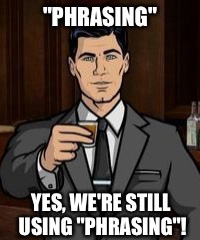
Phrasing refers to how music is constructed.
Whether it’s dance or rock music, it is all built-in phrases, usually in bars of four with four beats per bar. Now when you are DJing you want to line up these phrases to make your mixes as smooth as possible.
Once you have your tracks at the same tempo then you need to play track two at the start of a phrase in track one.
You may be familiar with this when you have heard people counting music as in 1 2 3 4, 1 2 3 4. This is counting the phrases.
This video explains things quite well
Gain Control With the Gain Knobs
DJs have multiple ways of controlling the volume of various elements of their tracks. It is these controls that they use to blend and mix tracks together.
Gain control can be seen as a type of volume knob for a track. Imagine you have two tracks but one is slightly quieter than the other. If you were to play them over some loudspeakers then the volume would drop when you played the second track.
To counteract this you have the gain knob. This allows you to turn up track 2 to make sure it plays at the same volume as track 1.
Think of the gain as being something you would set just once for each track. When it comes to actually mixing and blending the tracks you still use the channel volume slider or crossfader.
Some DJ software has automatic gain functionality i.e it will try and play tracks at the same volume to help you out.
Just be aware that this is what the gain does. It gives you just a little bit of extra control over the overall volume of your tracks.
A Note on Red-lining
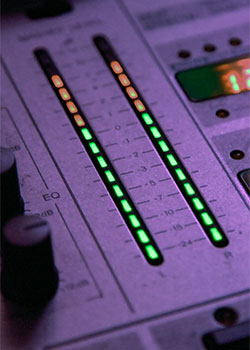
Tracks are meant to be played at a certain volume, which is why you have volume meters jumping on your mixer. If you play your music too loud then you’ll find that meter going into the red. This is not advised as you are playing the track louder than the producer intended and aside from anything, it can lead to the track distorting.
If you do this in a club then it can cause clipping, which causes part of the track to not play as it is in danger of blowing the sound system. To prevent it some sound systems will suddenly drop the volume (this is called a limiter).
Just remember not to redline your tracks. Aside from anything else it can be difficult for the crowd to listen to and might actually clear the dance floor.
EQing (or Equalizing)
The EQ knobs are another type of volume knob except that they control specific frequency ranges within your track. You may have heard of the terms Bass, Middle, and Treble/High, that’s what these knobs control.
So, if you turn the Bass EQ all the way down then you would the bass line or the bass drums would drop. Leaving you just the vocals or the melody line of the track, for example.
It is having this fine control over the different layers that allows you to blend multiple tracks together.
For example, you can turn down the mid & high on one track leaving just the bass. Then on the other track take out the bass altogether. Suddenly you are creating a new tune by merging the bass from one track with the mids & highs of the other.
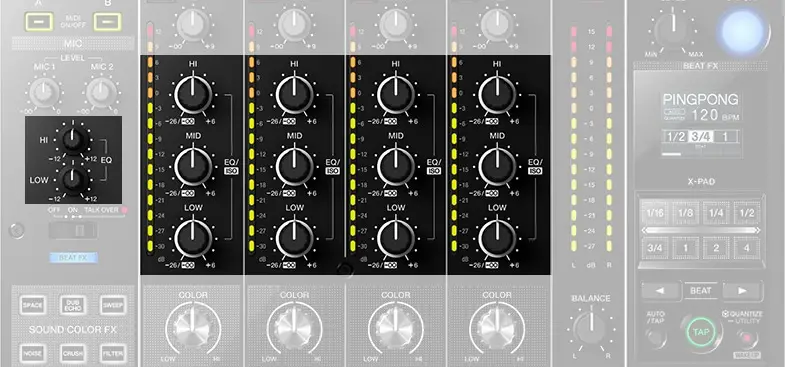
Creating “space” Using the EQs
When merging tracks it is important to think about “space” within your mix.
An individual track is built in such a way as to keep a dance floor moving by itself. If you suddenly start playing another track at full volume, then it’s going to be loud, messy and very obvious to people that two tracks are playing. This is because you haven’t created space before bringing the second track in.
This is what the EQ knobs allow you to do.
For example, turn down the bass EQ to halfway on two tracks, the two combined make up one full bass line. This is the way to think about EQing and mixing.
A couple of general rules with EQ is to make sure that, as a default setting, your EQs are always at the 12 o’clock position ie pointing upwards. This means you are hearing the track exactly as the original producer intended.
You only want to adjust the EQs when you are mixing and bringing in another track.
This is what I mean by creating space, If you’re bringing in a new track then you’re going to want to turn down the bass on track 1 to make room space for the new coming in from track number 2.
You are very rarely if ever going to want to turn EQs up. Generally, you will always be turning EQs down to take frequencies out, rather than boosting the frequencies up even more.
Tips for Learning Beatmatching
When learning to beatmatch it is a good idea to pick tracks that are similar in BPM. Then you only have to do minor adjustments to the pitch (i.e the speed) of the tracks to match them.
If you pick tracks with wildly different BPMS then you will find that you have to speed up one track way too fast. Similar to when you speed up vocals too fast and they sound like Chipmunks. That is when it’s obvious to your audience that you are playing a track too fast, and you don’t want that.
Blending Allows You to Mix Without Beatmatching
Another idea is to find songs that don’t have beats in the intros or outros. This makes them a lot easier to blend as you don’t have to worry about any beats clashing. Instead, you can just blend a nice instrumental section from one track into the instrumental section of another.
One thing to be mindful of here is that it’s okay to merge vocals into an instrumental section of another track. However, be careful not to blend two different vocal lines into each other. Otherwise, the mix becomes very obvious and messy.
So remember, keep it simple at first. Your skills will naturally develop as you learn what tracks sound good together and how they can be merged.
Harmonic Mixing: An Advanced Form of Mixing
You may know that songs in the same key will mix better than songs in different keys.
DJ software will analyze your tracks and tell you what key they are in. This allows you to choose your next track accordingly, either in the same or a complementary key.
However, with practice, your ears can tell which tracks sound right and which sound wrong together. Although software and technology can do some of the work for you, it is best to be able to tell the difference yourself.
Remember you have better music tastes, and you can tell what sounds good, better than your laptop can.
All DJ software actually has key analysis built-in. You can read more about this in this article about organized your music library.
Do What Interests You
There are many different ways to merge, blend and mix tracks. How deep you go into individual techniques and methods depends on where your interests lie.
Turntablists or exhibition DJs become obsessed with learning new techniques to cut and mix from one track to the other. As such, they get very involved in the technical side of using the mixer, cutting volumes and tweaking EQs, etc.
Other DJs will become much more obsessed with having a large music library and knowing their music back-to-front. They instead spend all of their time researching, collecting music and learning how to blend these together.
So while they might be less skilled in the technical side of mixing, they (often) have a deeper knowledge of music. That allows them to select the perfect track for that club and that audience at that moment in time.
So, remember you don’t need to be the best technical mixer or you don’t need to have the biggest music library.
Whatever you find most interesting about DJing then spend the time learning and exploring that. This will make you a happier, more successful DJ in the long run.
To see what type of gear I suggest, for all types of DJing, check out this page.
Mistakes Happen
Another thing you have to learn when starting as a DJ is to not hang on to mistakes. Trust me you will make plenty, as do all DJs. The best DJs, however, forget about them instantly and just move on. They know there is another mix coming up and that needs their full attention.
Sometimes, when you hear the beats slipping then it can be best to just cut the track that you are moving out of and keep playing the next one. Often when you try and rescue a mix you can actually make it worse, especially when starting.
With experience, you will very quickly be able to hear what is wrong and be able to correct it almost instantly. Often without the audience even noticing.
Learn by Recording
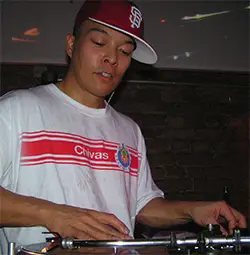
A great idea when learning is to record every single one of your practice sessions.
Not necessarily for use on social media. More for you to listen back within the next day or so when you are away from your equipment.
Try and pick out where you could have improved and tweaked your mixes to make them smoother. By recording, you can critique yourself and learn a lot quicker than trying to do while practicing.
One DJ, Qbert, videos and critiques every single live show that he does. He then knows what he can improve at the next show, he has done this for his entire career. This has helped make him of the best scratch DJs the world has ever seen.
Further details on recording mixes are included further down the post.
Learn Some Basic Music Theory
Although not essential to become a DJ, it can be an idea to watch a few lessons on YouTube. Just so you understand some of the basic elements of music theory as it applies to all genres.
Even basic knowledge about how music is constructed, how to count beats and bars can go a long way in speeding up your DJ learning.
Don’t Rely on Software to Do the Job for You
Although software can do some of these jobs for you, it is always worth learning to do things by ear. This allows you to hear very quickly if something is not right with your mix. All of this will make you a better and more confident DJ going forward.
Remember not all clubs have the same setup or equipment. And not all equipment is the same in terms of how they work and how reliable they are.
Once you learn these techniques by ear then you will be much more confident going into these venues and using different equipment.
I know these various concepts, terms and ideas can seem overwhelming if you are just beginning. Just break things down and learn each section individually. Very soon everything will seem easy and become second nature to you.
Getting Familiar with DJ Equipment
With the right software, you can DJ using just your laptop, keyboard and mouse. However, as you become familiar with mixing you’ll find this quite slow and restrictive.
The real power in DJing and mixing comes from being able to control and manipulate lots of different elements within your music. This is where proper equipment is vital.
There are two main types of DJ equipment
DJ Controllers

Controllers are effectively arrays of buttons, sliders, faders, knobs, and platters. Similar to what you might be familiar with seeing in a club, particularly the all-in-one units.
These are amongst the most cost-effective ways to get into DJing. You can get all-in-one units that you plug into your laptop or via a USB stick that goes directly into the unit itself.
There is a huge range of different DJ controllers, far too many to go into in this guide without confusing things. If you want to read which is the best DJ controller for all budgets then see our full guide or continue reading and the link will be included again at the bottom of the page.
Push here to see which DJ controller I suggest.
Aside from all-in-one controllers, you can buy general controllers. These can be mapped to any type of software, DJ or otherwise.
This can be a cheap option to build your DJ setup or to complement other bits of equipment and extend functionality.
Each bit of software discussed above has its own specifically built hardware. Although these are generally not essential to run that software.
The benefit of buying general bits of hardware is that they can be used for other tasks. For example, as well as using it for DJing, I used my Akai LPD8 with Photoshop as a quick way of selecting tools.

CDJs
These are what took over from vinyl decks as industry standards in clubs and festivals around the world. It is most likely these that you think of when you think of DJs mixing on decks.
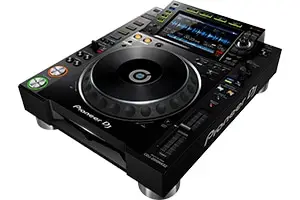
These allow you to plug USB pen drives directly into the decks and play from there. Previous versions were designed to play CDs and you’ll often still find these in (smaller) clubs to this day.
Connected to any standard mixer this setup is completely independent of needing a laptop. Although more expensive than all-in-one DJ controllers it is a good idea to familiarize yourself and practice on them. Even if you don’t buy a set for yourself.
As the industry-standard, you will come across these in your career so it’s an idea to be familiar with them. Plus, if you can mix on these then generally you will find it easy and intuitive to then mix on any other type of controller. For the most part, most follow the same format of these CDJs.
Push to see our recommended decks.
Mixing With Vinyl
Vinyl might be the original way of DJing but has become one of the more problematic methods over the years.
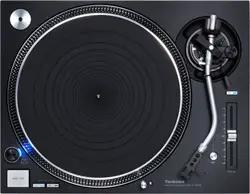
Despite the recent upsurge in vinyl sales new music on the format is increasingly rare. They are also expensive and heavy to carry should you take a large collection in order to freestyle a gig.
Another issue is that, since the industry standard became CD decks, a lot of smaller clubs let their vinyl decks go without servicing. Leading to problems in terms of reliability and sound quality.
That said there is a lot of charm to vinyl DJing. It’s the only method where you feel the music through your fingers as the platter moves against the needle.
So while it might be ok for home DJs, or those big enough to demand serviced vinyl decks, they are probably not the best method for a new DJ.
It’s a shame but it’s the truth.
See our recommended vinyl decks here
Time Code and DVS Setups
The latest wave of technology has brought a compromise with vinyl decks. Although sadly it still doesn’t skirt the issue of poorly serviced and maintained turntables.
Timecode setups have a special type of vinyl that plays a tone into your laptop. This is then converted into audio depending on the track you have selected on your laptop.
You will commonly see this type of software referred to as DVS which stands for Digital Vinyl System or Digital Vinyl Software.
This allows you to cut and scratch on your decks exactly as if you were using real vinyl. A huge benefit is that you only need to carry two vinyl as the rest of your music is stored on your laptop.
This method also gives you access to all the features available in other DJ software.
You can combine this type of system with add-on controllers if you wish. For example, pads allow you to do things like finger drumming or track selection. Using the two together allows you a very flexible setup.
You will see this type of setup with a lot of turntablists. They originally learned the craft on pure vinyl and continue to update their setup to incorporate all modern technology.
A lot of the most recent CDJs and DDJs come with these functionalities built-in. Allowing you to link the decks directly to the software on your laptop, essentially turning them into a controller without the need for special CDs.
There are several of these DVS systems available which you can read in our full comparison page here. Or continue to read this guide and the link will be available again at the bottom of the post.
Headphones
Another bit of essential equipment is, of course, a decent set of headphones.
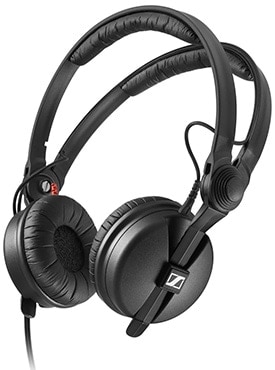
The current industry standard for DJs are the Sennheiser HD25s although there are decent headphones for every budget. Rather than list everything here you can read this specific guide. Or continue reading and you’ll find the link again at the bottom.
Your DJ headphones should probably be the over-ear style although this is very much down to personal preference.
Over-ear headphones are useful, particularly when you start DJing in clubs. It can be very noisy and over-ear headphones can help block things out and help you concentrate on producing the best set you possibly can.
Some headphones are tuned specially for DJs i.e they boost the bass to aid with club mixing. This is because it is often easier to mix using the bass drums than it is, for example, the high hats.
So just be aware that different types of headphones can be tuned in different ways.
See which headphones we recommended here.
Speakers / Monitors
You will also need some speakers which, perhaps too obvious to state, allow you to hear what you’re mixing.
In your headphones, you’ll be beat matching and lining up the next track before you play it out through the speakers. There is a full list of speaker comparisons here or continue reading and the link will be included again at the bottom.
Mixers: Tying Everything Together
Depending on your setup you may also need a mixer.
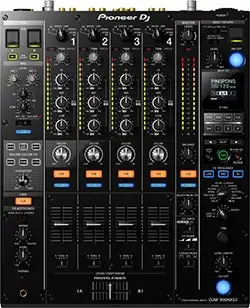
This is what allows you to plug in and mix two different sound sources. In most cases, this is two decks while on the mixer you will find the volume controls, gain and EQ knobs (as discussed above).
Mixers vary massively in price and features but when starting you don’t need to go over the top.
In fact, it is better to learn the basics without getting distracted by loads of effects and other features.
Again you can see my recommended mixer here.
Laptops
When running DJ software you do want the fastest laptop available.
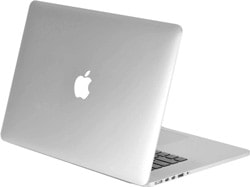 Apple laptops are the best for DJing, if you can afford one” />
Apple laptops are the best for DJing, if you can afford one” />
For a long time, Apple has reigned supreme so if you can afford one then it will serve you well.
However, recently they are becoming increasingly expensive which does make them prohibitive for people just starting.
In any case, depending on your budget, you want to go for the absolute highest spec you can afford. An Apple if possible, Windows laptop if not.
A Note on Buying All This Equipment
While you will want all of this equipment there is no need to buy everything top-of-the-range straight away.
A lot of the basics can be learned on virtually any DJ equipment and this does actually have benefits. If you can sound good and create slick sets on basic equipment then your skills will instantly jump a notch when you upgrade.
So, it is not necessarily a bad idea to learn on entry-level equipment.
Love DJ gear?
So do we, check out our favorites…
Best Way to Become a Good DJ? Record EVERYTHING
Getting in the habit of recording mixes serves a couple of purposes. In the longer term, it gives you plenty of content to share on social media and get your name out. In the short term, however, it is a great way to accelerate learning and improve your skills.
The key is to record your sets/mixes and then listen back to them after a day or two.
You will be able to hear the songs that worked well together and the mixes that you could have improved on. You’ll also start to automatically pick out when a mix doesn’t sound right and how you could fix it next time.
This is why it is such a good idea, as you become a DJ, to get in the habit of recording everything.
The other thing it does is make you feel like you are actually “performing” instead of “practicing”. Something magic happens when you see that red recording light blinking, it feels like you are actually on show. Similar to how you would be if you were in front of a crowd.
So the more you practice when under a little pressure (the red light), the more relaxed you become with it. Then, in turn, the more relaxed you will be when you have the pressure of a crowd in front of you.
Recording a Set Is Usually Pretty Easy
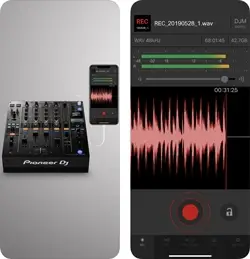
Most software that you use will have a built-in option to record your sets.
If you are not using software then you can use an external recorder. The Zoom TK h1 is a good choice as you record using an RCA cable that plugs straight into your mixer. That said, it is quite easy to record directly into your iPhone using apps like DJM-REC.
The other thing that listening back to your mixes will do is give you an understanding of the flow of your sets. For example, if you slam out banger after banger then you will find this quite exhausting to listen to. After an hour or two of non-stop heavy bass lines, not only will your ears feel fatigued but imagine trying to dance solidly to that constantly. You would be, quite literally, exhausted.
And this is why good DJ sets go through ebbs and flows. There’ll be quieter, slower bits and there’ll be buildups to intense, hectic sections.
Not only do quieter sections give your crowd a bit of time to recuperate some energy, but they also help build tension and give a bigger impact when you do drop the big, heavy tunes.
Think of it Like This…
If every single tune you play is a banger… then none of them are…
This is because they would all be at the same intensity.
Whereas if you put a banger next to a chilled tune then, by comparison alone, it will have more power and impact on your crowd.
“Journey” is another way of describing this. The best DJs take their crowds on a journey and are able to convey emotions and vibes. This is what people mean when they talk about a DJ set having “good vibes” i.e that DJ was able to take them on a journey rather than just smashing out big tune after big tune.
And then, as mentioned, another benefit of recording constantly, any mix you are happy with makes for perfect content for you to share on social media. You can upload to Mixcloud or SoundCloud to help build a following and to send to promoters as examples of the sets and music that you play.
So, just get in the habit of recording, initially just for your own listening or perhaps to share with friends to get feedback. Just don’t put too much stress on it or yourself.
The more you record, the more comfortable you will be with the slight pressure that puts on and the better DJ you will be in the long run. Listen back and give yourself constructive criticism on what worked, what didn’t, and what you can do better next time.
Recording Regularly Is a Top Tip in How to Become a Dj.
This kind of analysis and self-critiquing also helps when you are learning from DJs that you admire. When you listen to their mixes you’ll learn how they construct and structure the ebbs and flows of their sets. You will then be able to see how your sets and construction compare and apply anything you learn.
Find Inspiration in the DJs That You Like
There’s nothing wrong, while you are learning, in trying to emulate people. In some cases, you can even use the same tunes and reconstruct sets that they have done. Do this purely as a way of understanding how, and why, they put those sets together and why those particular Tunes work so well together. There is no shame in using inspiration and emulation to further your skills and understand how to build impressive sets.
A Note: Create Something from Start to Finish.
The suggestion to create something from start to finish is actually an encouragement to not get hung up on mistakes.
Decide to create a mix of 30/45/60 minutes whichever you prefer and then go and record that mix in its entirety. if you make a mistake then don’t worry about it, keep going and finish the time allocation that you set.
If you restart with every mistake, particularly when starting, then I guarantee you will rarely get through an entire recording. Even professional DJs make mistakes. So, just keep going and every mix you do, make sure you complete whatever time allocation you gave yourself.
It doesn’t matter if the first hundred mixes have mistakes. Every single one will be a learning experience and will help you improve.
How you become a world-class DJ is by not getting hung up on mistakes, practicing often and having faith that you will get there. Trust me, you will get better every single time you practice.
If you find it makes things easier, then you can plan out a setlist. Choose tunes beforehand that you know are going to work and that you can mix well together. However, you should also become comfortable with just freestyling or making your setlist up on the fly.
Over time you’ll learn which tune will flow into the one playing but, when starting, just play whatever tune you want to hear next. Doing this will help you develop your style
Again, because you’re recording your mixes then you’ll be able to listen back and pick out what worked and what didn’t. Gradually over time this all reinforces your knowledge in your brain and makes all of this stuff second nature.
A Cliche But… The More You Practice the Better You’ll Get
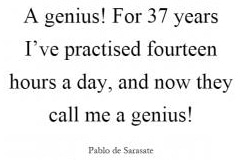
Also, the more confident and relaxed you become, the easier you find you will find mixing, creating sets and playing live. Of course, everyone gets nervous but there are tricks to help you deal with this.
For example, nerves are very close to excitement. So, instead of saying you’re “nervous” simply tell yourself “I’m excited about the gig” or “I’m excited to record this mix today”. You’ll find this something incredibly powerful in switching how your brain perceives those feelings and that relaxation will carry over into your set.
You will then find it much easier and, more importantly, much more enjoyable to play. Both when recording at home or in front of a crowd.
Creating Your Brand and Building an Online Following
For DJs wanting to make a name for themselves, play clubs and eventually start touring the world it is essential to build both a brand for yourself as a DJ and build your online following.
It is now things like Facebook fans and Mixcloud follows that influence who bookers choose rather than the old method of record sales.
Make Sure You Are Sharing Mixes
As discussed above, one of the best things you can do as a practicing DJ is to constantly record mixes.
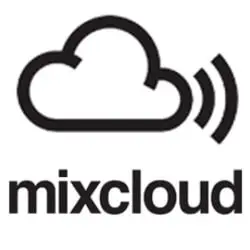
Not only does this help you improve but it also means you have a steady stream of content to put out. If you are recording two or three times a week then it’ll be easy to choose one to put out. Once a month or every week, whatever works for you and the amount of time you can allocate to building your online presence.
The best place to host your mixes is on Mixcloud. Not only do they have auto-track tagging but they also do not take your tracks down for copyright. Places like YouTube, SoundCloud and Facebook tend to auto-remove mixes if they think someone has a copyright claim over it.
When you are filling out your social media profiles starting with Mixcloud make sure you complete them properly. Do some research and look at some DJs you admire to see how they have filled out their profiles.
Spending a little time on a complete bio, links to your other socials and multiple ways to contact you will serve you well. Don’t rush this and, again, be sure to have clear methods of contacting you. You’d be surprised how many DJs are bad at this.
You can also create private links on things like Mixcloud. This is a great way to get feedback if you’re not yet ready to put your mixes fully public.
You can then send this private link to friends, and people you trust, to ask them for honest feedback. This will help you improve quicker, but do also remember that music taste is subjective.
Creating Your Brand Online
Although you want to be careful not to distract from the actual practice of DJing too much, it is important to create a brand around yourself and your DJ persona.
This starts of course with your DJ name which you may already have in mind. If not, then I’ll include a link at the bottom on how to come up with ideas and check if they are available.
Once you have a name, you’re going to want to design a logo and perhaps some basic artwork around that. But the logo will always be your starting point.
Again do not worry too much about that at this stage. This can be changed down the line.
Once you have some basic images and artwork then I suggest setting up a Facebook page, Instagram profile and of course add your artwork to your Mixcloud account.
It is also an idea to get business cards made.
Often, in a club, it may be too loud or you may be too busy mixing to pass on details. So having cards in your pocket is a quick and easy way to ensure someone can contact you later.
After all, networking is an important and key component of how to become a DJ.
Don’t Obsess About Social Media
I want to mention not to get too bogged down in trying to churn out content for your social media.
Initially, you want to be focusing on honing your craft as a DJ and getting those skills up. Being able to go into clubs and perform good sets should be your priority when you are starting out.
However, this process in itself gives you an opportunity for social media content.
Like when buying new equipment for example. Each piece can be a new post with you talking about the equipment and why you bought it. The same goes for each new feature, or trick, that you learn on that equipment. They can all go in separate posts.
This will keep your accounts active but it will also show that you are learning and documenting your journey. That you are willing to share and teach other people how to use their equipment. This has the benefit that teaching helps you improve faster as well.
Another great and easy way to share content is if you discover a new track that you love. Take a screengrab of the artwork and share it. Describe why you love it and that you’re looking forward to including it in your sets.
As I mentioned above, don’t get overwhelmed with trying to post to social media. Instead, just keep people updated on your journey.
As you learn and discover new things then make a quick post and share that. This alone keeps your account active while giving you a journal to look back on. You will be able to see where you came from and where you’ve progressed to over the time you’ve spent DJing.
Be the Social One in Social Media
It is also a good idea to network online. Find other DJs you admire, comment on their posts, learn from them and interact with them.
If you interact with the same people constantly then I guarantee they will learn your name, they will check out your profiles. Online networking is that simple, so be sure to be active within the DJ world. Both local to you and beyond.
Remember that DJing and social media is a community. The more that you can interact and share with that community then the more benefit you can draw from it.
Find some Facebook groups to join where you can share your mixes. However, be sure to give more than you take. The more people’s mixes or songs that you comment/give feedback on, then more likely that people are to check you out. So remember, the more you give, the more you will receive.
You don’t always have to rely on always putting out long mixes for your socials. Instead, make it a mixture of mixes interspersed with shorter snippets, behind the scenes and insights into the life of a developing DJ.
All of this will help build your audience and get them to know, like and trust you. The key to building a following online is getting your audience to feel like they know you.
Another easy way to build shareable content is to create playlists of music. This is not necessarily mixes that you have recorded, but instead shows the broader taste of music that you have. Perhaps you theme it on what you listen to when you are chilling out for example. You can then share these playlists to further give people an insight into the full range of your music tastes beyond what you drop in the club.
Collaboration Can Be a Fast Track to Becoming a DJ
Another good way to build a following is to do collaborations with people. This could be as simple as going to a friend’s house and recording a mix with them. You could do a back-to-back mix and then you both share that through your socials. Or you could reach out and actually interview other established DJs and then share that through your socials. Chances are they will share it as well, so collaborations are a great way to build a following by exposing yourself to wider groups of people.
Make Yourself Known at Any Shows You Do
In the early days, it is also a good idea to play as many shows as possible. We’ll discuss this below but the more shows you do, the quicker you learn and the more people know about you.
While playing shows it is always an idea if possible to have your name displayed somewhere. Whether it be on a projector where you display your name & logo, or perhaps you have a banner made that you can hang below the decks. Either way, make sure people should know who you are and how to find you.
Social media is also a good opportunity after gigs to thank the promoters and the club publicly. Not only does this give them further promotion after the event, but it will also further your networking with those involved. They will then be more inclined to book you again knowing that you appreciate them and have complemented their work.
Remember That Social Media Is Meant to Be Fun
Most of all have fun on social media. If DJing or practicing starts to feel like a chore then you’ll find it harder and harder to do and eventually might even give up.
So the more fun you have with DJing, and with your audience via interacting, then the easier you will find it to practice and keep pushing until you have achieved your goals.
It Can Also Be Your Connection Out
DJing is a fairly niche hobby and career, so you might often struggle to find existing friends that have the same interests and can help support you.
Again this is where your social media accounts can come in handy, They help you find your tribe and community online. Don’t be afraid to reach out and connect with other DJs that play in your city. It won’t always work out, but often you will find that they are happy to chat and offer advice. Sometimes it may even lead to them booking gigs for you.
Building a support group of people who have similar interests is a great way to further not only your network but your skills as well.
One of the great things about DJing is that going out to see other DJs can be part of the job. Which gives you more opportunities for social media posts. You can to a club, see a DJ then talk about why they were so good and what you enjoyed about their set.
Remember to tag them as, chances are, they will then visit your profile. They may even end up following and connecting with you. At the very least a lot will say thank you for the acknowledgment.
This is a great way to network but just be careful not to get too lost partying so that you never actually end up practicing or DJing yourself.
Down the line, you will want to create your own website to provide further information about you. Don’t worry about this when starting, this can come down the line when you have money coming in. This way the website will essentially pay for itself.
Getting Out There & Getting Gigs
House Parties
There are many ways to start getting your first DJ gigs, online networking is just one of them. The first few gigs will always be nerve-wracking but are vital learning experiences. One of the best ways to start performing in public, in a relaxed, low-pressure environment is at house parties.
Whether you throw your own or take your equipment to a friend’s, it is a great way to test your skills. You will also start learning how to read a crowd and adjust the flow of your set, depending on how they react to your music and your track choice.
Playing in Bars
In terms of playing in venues then there is no better way than literally going in and asking face-to-face. When you initially start, a lot of these opportunities will be unpaid and maybe on the quieter weeknights.
For example, when I started DJing I asked, in one of my favorite bars, to do a drum and bass night on a Wednesday evening. While I didn’t get paid in cash, I did get free drinks.
Although it was more of a bar setting than a club dancefloor, it still gave me valuable experience. Both in playing in front of people and learning to relax while there was an audience listening.
Getting Club Gigs
Most clubs tend to have several promoters or people running events at their club. Therefore it is a good idea to identify the event you want to play at, i.e do they play your genre. Then find out who is organizing that particular event and then find a way to get in touch with them.
Again, they might need a support DJ to play early in the night. Although, to begin with, you may be playing to a quiet or mostly empty venue, this still builds valuable skills. Including performing in front of people, playing over loud PA systems and using equipment that is slightly different from your home setup.
Another good way to keep yourself in front of promoters and organizers is to just be involved in the scene. Go regularly to events, be professional and polite but also make yourself known. At the venue say hello to the organizer, congratulate them on running a good event and have a little chat. Maybe offer to help, it doesn’t even have to be with DJing initially. You can help them with promotion for example. Then, if they are a decent promoter, as soon as they need a DJ slot filling, you will be top of mind.
Again this is where networking and always having business cards on hand is a great idea. Plus having your online presence up and running. That way you can easily refer anyone who asks where they can listen to your mixes.
Consider Running Your Own Night
Another great way to gain a vast range of knowledge is to run your own night. While at university I, along with friends, used to do exactly this.
There were five of us and, aside from having a great night, it taught us:
- how to deal with venue owners
- planning & structuring nights
- Promoting
I also had a friend who went on to run much bigger nights. Although he never made masses of money (we lived in a fairly small city) it was definitely successful, with some impressive guest DJs. His reason was that he loved to see his own DJ name on the posters below his favorite DJs.
He got to choose who he booked meaning he could meet and network directly with DJs that he admired. And that is true passion, doing it for the love of the music. All while putting in the work to actually make the scene also work for you as a DJ.
Of all of my DJ friends he worked the hardest, played the most gigs and had the best network. So, in this game, passion and drive really do pay off.
Networking Doesn’t Have to Be “Businessy”
Networking is the key to making it as a DJ. This puts a lot of people off because of the business associations with the term “networking”. It feels like work, but it doesn’t to be.
Instead, you should think of it, and treat it as, just making friends with people who have similar interests. Who think along the same lines and have the same goals. Your aim is simply to make as many friends in all areas of the scene as possible.
Then just help out and support each other. When people see that you are active and supporting everyone else, they, in turn, will support and promote you. They will be inclined to help you achieve your goals as you helped them.
This is often why you see so many DJs appear to be good friends. It’s because they have supported each other for years, long before anyone else knew who they were. So now they get to celebrate and enjoy the result of all that support and hard work.
In This Industry Being Professional Makes You Stand Out
When getting your first gigs, and throughout your career, always be professional. In the DJ scene, there are plenty of unreliable people. Lots of chancers trying to win without being willing to put the effort in.
So, what makes you stand out, is to be someone that always shows up on time and tries their hardest. And, this is a vital point, remains sober when talking to promoters or event managers.
Far too many DJs get lost in the party scene and this presents them as unreliable. Then if a promoter has to choose between someone who gets messy during gigs and someone who doesn’t, they would go for the more reliable option. Always.
That’s not to say you can’t enjoy parties, of course, you can. Just separate it from when you are “working” and promoting yourself. Be the kind, professional, polite one in the scene. Trust me that will get you a lot further than the DJs who spend their time getting drunk/high and shouting down the ear of the promoter.
Stay Organised, it Makes Your Life Easier & You Progress Faster
On the organizational side of getting gigs, be sure to keep a list of the promoters and their contact details. Even if they can’t help you the first time around, keep in contact with them every few months or so.
Don’t hassle them, but you may find that someone that initially said no, might suddenly have a gig for you. So being organized and building yourself a contact list can pay dividends.
Likewise, don’t ever get put off by rejection, it is simply part of the scene. All DJs that are established and doing well have had to learn to deal with rejection and move on without dwelling. So if you don’t hear back from a venue/promoter, or they say no, then that’s just fine.
Just assume they were fully booked or busy at that moment and move on. Find your next event promoter to contact and reach out to them.
The scene is plenty big enough for everyone so it’s all about:
- knowing your worth & having the skills to back it up
- how you organize yourself
- dealing with and growing from rejection
- have the commitment and dedication to get you to where you want
Never Underestimate the Power of Straight up Asking
Never be afraid to ask for help. Contact venue owners and ask them who would be the first best person to speak to about events. Ask your friends or acquaintances if they know anyone that you can talk to even slightly related to the scene.
As, even if they can’t get you a DJ gig straight away, they may be able to refer you on to other people. It is by simply asking for help that a lot of DJs were able to start building their network in the first place. Remember DJing is a community, so use that fact.
Have a Few Hats to Wear…. Not Literally, Unless You Want To.
Although you may have a manager down the line, in the early days you will be doing various roles yourself. You will act as a promoter, manager, and marketer so be prepared to wear any hat necessary. Doing so will help you on those vital first few steps on the ladder towards being a DJ superstar.
Other Ways to Get Gigs
- Look for brands or small businesses that regularly do events or product launches. Tailor your offering/sets to them and become their go-to DJ.
- Approach small businesses and offer to DJ at their corporate events. These are often held in venues and need music to soundtrack the night.
- Offer to DJ other people’s house parties. If you know they don’t have a proper music setup then offer to take your own equipment down. This can be a great way of practicing live gigs as with your equipment you’ll be fully familiar with the setup. Just be careful there no one spills a drink on it.
Play to the World, Without Leaving the House
Another great way to get some live experience is to do things like Facebook and YouTube live. This gets you out there and in front of a virtual, but real, audience.
People will be listening so you still have the feeling of “performing”. However, there was a lot less pressure as you are still in the comfort of your own home, with your own equipment. That you know exactly how to operate. So live streaming can be a great way to dip your toe into live performance and playing in front of people.
Practice Makes…
Remember that practice makes perfect. However, this doesn’t just mean practice at home. It means to practice in front of an audience and in venues. This is a different level of practice altogether. It will teach you to overcome nerves and instead treat those feelings as excitement.
The more you practice in different venues, with different crowds, and on varying equipment then the more confident you become in your skills. The more confidence you have as a DJ then the easier you find it to ask for gigs and the more you will get booked. So remember practice, practice, practice.
Being Helpful Means You’ll Be in the Right Place at the Right Time
Another great way to get in with event companies, promoters or venue owners is to ask for work experience or an internship. Offer your services for free to get yourself into that company and around the people that make things happen.
Not only will be learning all sorts of things about the scene, but you will also learn how they book and choose their DJs for events. Of course, they will know you’re a DJ and, because you are offering your time for free, as soon as they have an opportunity you will be first in line. Companies are often keen to “payback” interns for the time they have volunteered and one way they will do this is by offering any DJ slots they can to you.
Mentors Are Everywhere
It can be an idea to find a mentor or someone in your area that you respect that you can learn from as you become a DJ.
They don’t need to be a super successful producer or DJ either. Just someone who has a bit more experience than you and you’re able to ask advice, questions or bounce ideas off. You’ll be surprised how many people are willing to mentor you if you just ask.
Frustrations Will Happen
You will get frustrated but don’t let that get to you. Those times will pass and you will, to be honest, occasionally have some bad gigs. Again you have to just let those go and move on.
Instead, realize what you could have done differently during that gig and apply it to your next one. This turns things from a bad taste in the mouth to a useful learning experience.
And trust me before too long the amazing fun gigs will far outweigh the ones that you struggle through.
Never Stop Learning & Expanding Your Skills
One of the great things about DJing is that it’s pretty easy to keep things fresh. There is always new music being released and there are new technology innovations all the time.
This means you should be prepared to always be learning. Learn to love the journey of being a DJ, of finding new music and new ways to connect with your audience. Doing so makes it impossible to get bored.
Over time, as you develop your network, you should find it easier to get gigs. You can then start to pick and choose the right gigs. You can base decisions on what you enjoy as well as what is going to earn you a decent living and achieve your goals.
Remember to always be polite, professional and courteous. You may also need to construct your sets in a way that is respectful of the event and the person who booked you.
For example, don’t expect to be booked for a wedding and then spend the entire time smashing out EDM bangers. That’s not going to go down well and won’t earn you a good reputation. At the same token, don’t go to an EDM night and play cheesy 80s music expecting to get a decent response.
DJing is all about reading the room and knowing how to best bring out the energy in your audience.
A Key To Become a DJ: Love Your Music and Your Audience
The best DJs engage with their audience and have a form of exchange during their sets. It’s times when it is clear that both the DJ and the audience are having fun that the best sets, and nights, are created.
So, remember to focus on the music first. If you love collecting and are passionate about your music library then you will always know what to play next. And having a large library means you’ll always have the right song available.
Over your career, you’ll be asked to play many different types of events. So it can pay to be versatile and not narrow yourself down too much. And there is a definite charm to playing different types of events.
While club gigs are great for partying, smaller, low-key bar gigs, for example, allow you to do much longer sets. Here you can express yourself fully and play a variety of music that shows off your range of musical interest.
So be sure to consider all the offers you get and doing a variety of gigs. All will be a learning experience and all are enjoyable in one way or another.
And Remember…
Practice, practice, practice. If you make the decision that you’re never going to stop learning then you will be unstoppable as a DJ.
Conclusion: How to Become a DJ
Now I know this has been a long post as I have tried to cover everything. You should now have a real in-depth view of the various aspects of what it takes to start DJing.
That said, it’s important to not get overwhelmed. You don’t have to memorize and master all of this stuff in one go.
A lot of it you will just learn just by practicing and playing around with your tracks. Then if you come back and read this article after even just a couple of weeks suddenly everything will make perfect sense. A lot of it will just become second nature to you.
Keep recording and listening back to your practice sessions. Remember it’s okay to ask people for feedback and ask others in the community for help.
You will find people are often more than willing to offer advice and guidance. After all, when you are asked for help it shows that someone trusts and believes in you. And that is a nice feeling. Don’t hassle anyone but also don’t be afraid to reach out even a couple of times asking for help.
And, of course, you can always reach out and ask me below in the comments. I’m more than happy to give advice and specific suggestions!
Most of all enjoy your journey as a DJ. It is one of the most exciting, fun things you can do! After all, YOU are the one in charge of the party.
And it doesn’t get any more exciting than that…
Frequently Asked Questions: Become a DJ
What kind of education do you need to be a DJ?
None at all. That is what is so great about becoming a DJ, you can learn everything you need for yourself. You just need some basic equipment (or software) and then time to practice. If anything all you need is an education in music, which again you can do yourself… simply by becoming involved in the scene you want to DJ in and immersing yourself in its music. Get hold of, and listen to as much music as you can while also learning who are the main artists, both new and up and coming.
Basic music theory will help but is not essential and you will pick up most things as you practice anyway. While taking a DJ course may accelerate your journey to become a DJ it is not needed and you can simply look on YouTube to fill in any knowledge gaps you have. There is no college degree requirement for becoming a DJ, experience and practice is far more important.
Do you need a college degree to be a DJ?
Definitely not. While there are college and short courses that teach DJing they are not required. In fact, you are much better served by putting in plenty of practice and starting to get real gigging experience asap. You can do this by offering to do free and cheap gigs for family and friends. This is the fastest way to learn how to become a DJ, really it is the only method. There is no way to shortcut the skills that you learn by actually doing DJ sets and interacting with a crowd.
In short, the best way to become a DJ is to get as much music in the genre you like as possible and then learn it back to front. Spend dedicated time learning how to beatmatch and compose sets and then get out doing gigs as soon as possible. Fairly soon you will start building a reputation in that genre that will allow you to get more and more gigs. After the initial push, you will find that your DJ career takes on a life of its own.
Do DJs really mix live?
Yes, true DJs do mix live. This is for a couple of reasons. 1, It allows them to bounce off a crowd and play tracks that they are responding best to. 2, It keeps things interesting for the DJ themselves.
If they are simply going out and pressing play on a pre-recorded mix then there is very little enjoyment in that. After all, the only thing you can do for the next hour is pretend to turn nobs and dance around. Plus it means that every DJ set they do will be exactly the same. There are definitely DJs that do pre-record their mixes but these are, thankfully, in a tiny minority and shouldn’t be considered true DJs.
How do I start my DJ career?
The best way to start a is to get hold of some software (Mixxx is free) and some tunes and to start playing around. It is widely agreed that the first few mixes will be terrible so it’s worth just getting them out of the way. Once you have learned some basics of beat matching and composing sets then aim to get out gigging as soon as possible. This is because playing shows is one of the fastest ways to learn. Not only does it encourage you to level up your skills but it also starts to teach you how to read, and respond to, a crowd. This is a vital skill for all DJs.
Playing at things like house parties are a great, low-pressure way to get some live experience under your belt. Once you are confident of mixing in from a crowd you can start offering your services for money. Start small and build up as you become more experienced, this is where the money is. If a client is paying you a large sum for a gig then they expect you to be professional and be flexible. Things like weddings, for example, may require you to sticks to timelines and adjust throughout the day. So you’ll want to make sure you have the experience and skills to make that doable.
What next?
- Now you know how to start DJing you probably need a name. Head here to find one you love.
- Wonder what superstar DJs use? Check out Skrillex’s software and gear here.
Sources
- DJ Kool Herc image by Bigtimepeace [Public Domain]
- DJ Qbert image by Griz-Lee Christian Zebrowski [Public domain]

